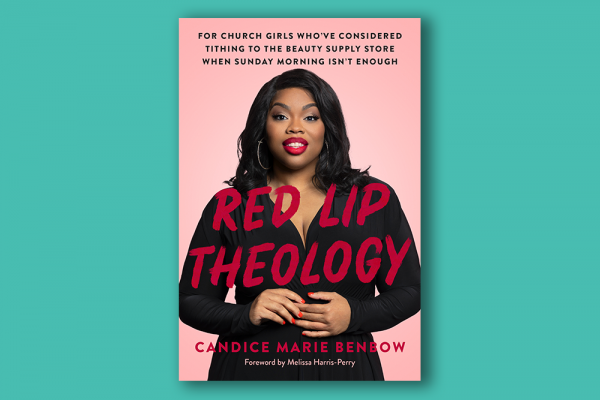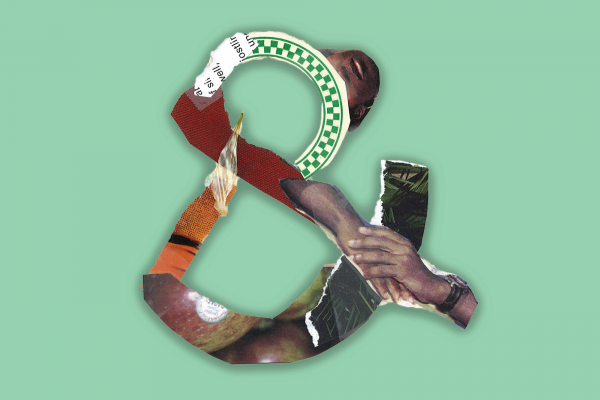In her new book, theologian Candice Marie Benbow takes readers on a journey through some pivotal and transformational moments in her life, highlighting the conversations she had with her mother, the theology informing her, and the sources — such as literature and hip-hop — that have shaped who she is. Red Lip Theology: For Church Girls Who’ve Considered Tithing to the Beauty Supply Store When Sunday Morning Isn’t Enough is an invitation to reflect on the moments, the people, and the religious institutions that have contributed to making us who we are.
I come to Red Lip Theology as a Black woman minister, Gen Zer, and seminarian of faith who, like Benbow, has grown up in the Black Baptist church in the South. Much of what Benbow discusses resonates with me: I’ve had to come to terms with the ways in which my own theology has been harmful to people in the LGBTQ community, for instance. And I know what it’s like to have to come to a new understanding of faith amid the unexpected loss of a parent. I continue to struggle with my own call to ministry within an institution that has not always honored Black women like me. Yet I still find hope in Red Lip Theology, a book that draws its title from Benbow’s promise to wear makeup as a form of self-love during a depressive episode. At that time, Benbow was also coming to terms with her own theology in seminary amid Whitney Houston’s death and the Black Church’s lack of response to Rekia Boyd’s murder at the hands of police. Benbow has gracefully articulated the type of faith that young Black women — millennials, those in my generation, and those in the generations to come — need. We need a faith that recognizes all of who we are and allows us to be authentically ourselves.
Benbow sets the stage to help us reimagine church. “And no — my time in church wasn’t all bad. I loved it,” she writes. “There is no other space where I was able to fully hone my voice and leadership skills in the way the church gave me room. It’s for this reason I push back against it. I love the church and want it to be the best it can be.”
In many ways, Red Lip Theology brings attention to the ways in which the church, especially the Black church, can do better as it relates to Black women and girls and other marginalized and stigmatized communities, such as unmarried mothers and people in the LGBTQ community. In each chapter, Benbow offers a liberating perspective on a topic that is significant to her life. For example, in the chapter entitled, “Suing God for Back Child Support,” Benbow addresses her experience of growing up with an absent father. While her mother refused to speak negatively about him, Benbow struggled with her own feelings about her father and the God who “was on the side of his homeboys.” There was a “danger in assigning gender to God.” As such, she comes to understand a God who is beyond gender, a God who understands both she and her father, and a God who “holds [her] father accountable for his absence in [her] life just as God holds [her] accountable for the ways [she has] lived contrary to [her] ethics and integrity.”
Throughout Red Lip Theology, Benbow invites us to reflect on the expansiveness of God — a God who sees Black women and girls as holy: “If all of creation is holy, then Black girls and women are holy, too.” She writes of a God who holds absent parents and those who preach and teach harmful theologies accountable. A God who meets us where we are. A God who loves our Blackness. A God who “honors our agency through free will.” A God who extends grace when we make mistakes. A God who is found in relationships with other Black women and sisterhood. A God who wants all creation to flourish. A God who “created us for interdependence and connection.” A God who can handle our grief, pain, anger, and disappointment.
In writing Red Lip Theology, Benbow expands the breadth of literature written for Christian women, specifically Black Christian women. She brings a progressive voice to a genre that, at times, has been dominated by more conservative and evangelical voices and those of white women. Her work is situated within a legacy of womanism, which she defines in terms of her belief that “when Black women thrive, the world thrives,” and that we must work “daily to create a world where that thriving is possible.” In Red Lip Theology, Benbow recognizes how her advocacy furthers the work of her womanist predecessors by incorporating lessons from both the church and hip-hop in a way that relates to Black millennial women.: “Red lip theology is the lens through which I understand myself as a millennial Black woman of faith. It creates space for both my upbringing in the Black Baptist Church of the South and my coming of age when America was embracing hip-hop’s aggressive, brash voice and bringing it into the mainstream.” In her essays, Benbow opens a space for Black women of faith to come to their own understandings of God and themselves, even if it means questioning and challenging what one has been taught as truth.
I would highly recommend this book to women who have grown up in the church asking questions of their faith. While Red Lip Theology is her journey, I believe that it invites us all to consider our own faith journeys. Like Benbow, we can each come to understand God in a way that is more freeing and liberating.
Got something to say about what you're reading? We value your feedback!







